
The text outlines a system of Universal and Life Laws, providing a framework for personal growth and understanding the purpose of human existence. It posits that suffering arises from violating these immutable Laws, while wisdom comes from recognizing and aligning with them. The document details specific Laws, including Love, Manifestation, Polarity, Evolution, Correspondence, Harmony, and Nature, explaining how they govern creation, human interaction, and personal development. It emphasizes the importance of virtues like happiness, peace, and love as drivers of positive outcomes, with the goal of evolving consciousness. Practical exercises and guidance are offered for applying these Laws to daily life, fostering inner harmony and improved relationships, health, resources, and environmental adaptation. It distinguishes Universal Laws from human laws, stressing the former’s immutable nature and the need for practical application over mere belief.
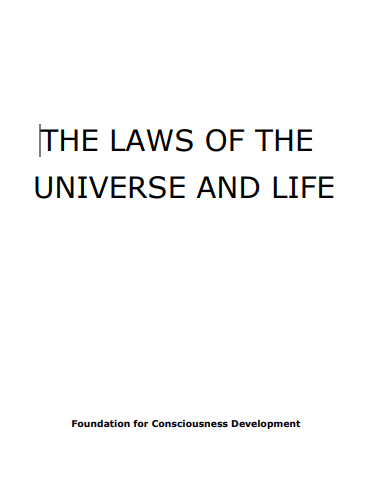
Frequently Asked Questions about the Laws of the Universe and Life
- What are the Universal Laws, and why are they important?
- The Universal Laws are immutable principles that govern the creation, administration, and evolution of the Universe. Understanding these laws is crucial because they influence all aspects of existence, from individual consciousness to social phenomena. Recognizing and aligning with these laws allows us to create a better future and live a more fulfilling life. There are seven main laws, and of these, four are fundamental, for they control the development and evolution of the consciousness of the human species anywhere in the Universe. These four Laws form the lower triangle of the Laws, while the Law of Evolution is the superior Law that governs the inferior triangle.
- How do the Universal Laws differ from human laws?
- Universal Laws originate from the wisdom of the Absolute and are immutable, non-repealable, and absolute. They cannot be amended or negotiated. Disobeying them leads to both negative (unpleasant) and positive (learning) outcomes. Human laws, on the other hand, are created by humans, and are repealable, transitory, and specific to a given moment. They are essentially rules, not fundamental Laws like those governing the Universe.
- What are the key virtues one should develop, and how do they impact life?
- The three key inner virtues to develop are Happiness, Inner Peace, and Love (or Service to others). Developing these virtues leads to positive results in relationships, resources, health, and adaptation to the environment. Happiness means experiencing zero suffering, peace means offering zero resistance to others, and love is defined as service to others.
- What is the significance of “destiny,” “mission,” and “function” in a person’s life?
- These are five key elements in the life experience of any human being: purpose, destiny, mission, function and intention. Destiny is what we come to learn from the world of matter; it’s the inevitable and valuable learning experience that helps us transcend limitations. Mission is what we can teach the world, what we already understand and enjoy doing. Function guarantees our support. Our support is guaranteed as a result of our function. Intention is what we want for ourselves or others, directed without interfering in others’ destinies. Wisdom involves being clear about our purpose, leveraging our destiny, enjoying our mission, accepting our function, and intending to not interfere with the destiny of others.
- What does it mean to live “within the Law” versus “outside the Law”?
- Living “within the Law” means valuing, loving, and enjoying what you need. It involves accepting what life gives you and flowing with the universe. Everything within the Law functions well and flows on its own. Living “outside the Law” is focusing on what you want, complaining about what you lack. It does not flow and it is the cause of our suffering.
- What is the Law of Evolution, and what are the three “characters” associated with it?
- The Law of Evolution facilitates our movement from ignorance to wisdom. It does that with the purpose of for us to verify what does not work, what is false, and to transform beliefs into truths of wisdom. The “characters” are: “the bad” (unfeeling), “the good” (sensitive), and “the wise” (desensitized). The ‘bad’ are unfeeling; ‘the good’ have feelings but lack understanding of the Law, often hindering others’ learning; and ‘the wise’ understand the Law, respect everyone’s experiences, and serve without interference.
- How can we use the Laws of Life to improve our daily lives?
- The Laws of Life offer practical guidance for navigating daily experiences. For example, the Law of Warning encourages observing details and signs to avoid potential issues. The Law of Opportunity helps us recognize chances for learning. The Law of Two emphasizes inquiring through action to determine what is meant for us. By understanding and applying these laws, we can transform difficulties into learning opportunities and achieve greater harmony.
- What are some practical exercises for aligning with the Universal Laws?
- Some helpful exercises include: making lists of what you want vs. what you have to increase appreciation, repeating positive affirmations to reprogram your mind, practicing desensitization to feelings to act as “the wise” character, and developing observational skills to recognize the Law of Warning. The main idea is that by flowing with the Laws and managing vital energy, we can have more fulfilling lives.
Universal and Life Laws: A Comprehensive Study Guide
I. Key Concepts Review
Before attempting the quiz or essay questions, make sure you understand the following key concepts:
- The Seven Universal Laws (especially the four fundamental ones)
- The “Triangle of Hell”
- The difference between Universal Laws and human rules/laws
- The three inner virtues (Happiness, Peace, Love/Service)
- The five elements present in human experience (Purpose, Destiny, Mission, Function, Intention)
- Within the Law vs. Outside the Law
- The Law of Love
- The Law of Manifestation
- The Law of Polarity
- The Law of Evolution (“bad,” “good,” and “wise” characters)
- The Law of Correspondence
- The Law of Harmony
- The Law of Nature
- The “I Need” vs. “I Want” perspectives
- Transmuting Destiny into Mission
- The 14 Laws of Life
- The Law of Warning
- The Law of Opportunity
- The Law of Two (Inquiry)
- The Law of Three (Perseverance vs. Stubbornness)
- The Law of Communicating Vessels
- The Law of Cause and Effect
- The Law of Saturation
- The Law of Generation
- The Law of Sharing
- The Law of Affinity
- The Law of Empty Spaces
- The Law of Option of Love
- The Law of Understanding
II. Short-Answer Quiz
Answer the following questions in 2-3 sentences each.
- Explain the difference between Universal Laws and human rules/laws.
- What are the three inner virtues that humans come to Earth to develop, and how do they relate to relationships, resources, health, and adaptation?
- Describe the five elements present in the life experience of any human being.
- What does it mean to live “within the Law” versus “outside the Law,” and provide examples of each.
- Explain the roles of the masculine and feminine principles in creation, according to the Law of Polarity.
- Describe the three types of characters (“bad,” “good,” and “wise”) as they relate to the Law of Evolution.
- How does the Law of Correspondence influence events in your life? Give an example.
- Explain the meaning and importance of the Law of Communicating Vessels.
- Describe how the ego steals vital energy according to The Law of Communicating Vessels.
- According to the Law of Sharing, what four situations arise when people give and receive information?
III. Short-Answer Quiz – Answer Key
- Universal Laws vs. Human Rules/Laws: Universal Laws are immutable principles of the universe originating from the Absolute, while human rules/laws are variable principles created by humans to organize society. Universal Laws cannot be amended, while human rules/laws are subject to change and repeal.
- Inner Virtues: The three virtues are happiness, peace, and love/service, representing understanding, acceptance, and unconditionality. These virtues, when developed, positively impact relationships, resources, health, and adaptation to the environment.
- Elements of Human Experience: The five elements are purpose (why we are here), destiny (what we must learn), mission (what we can teach), function (how we serve), and intention (what we want, but must align with our destiny). They represent the fundamental aspects of our existence in the material world.
- Within vs. Outside the Law: Living within the Law means accepting and flowing with what is, valuing what we have, and experiencing alignment with the universe, while living outside the Law involves resisting reality, wanting what we lack, and experiencing suffering and frustration. An example of “within the Law” is valuing current possessions, while “outside the Law” is constantly complaining about lacking more.
- Masculine and Feminine Principles: The masculine principle is the transmitter and creator of information, while the feminine principle is the receiver and container of information. Creation requires both principles because information must be transmitted (masculine) and received (feminine) for manifestation to occur.
- The Three Characters: “Bad” characters are unfeeling, “good” characters have feelings but are ignorant of the Law, and “wise” characters understand the Law and act with desensitization, respecting everyone’s experiences and serving without interfering. The “wise” character understands the laws of nature, harmony, correspondence, and evolution.
- Law of Correspondence: The Law of Correspondence dictates that everything manifests in accordance with the need for evolution and the individual’s current state of being. For example, a person facing constant financial struggles might be meant to learn about financial responsibility and resource management in this lifetime.
- Law of Communicating Vessels: This law states that energy flows from high levels to low levels; when interacting with someone with low vital energy, one’s own energy may diminish unless feelings and emotions are controlled. To help others, one must act from understanding and wisdom, avoiding suffering and preventing energy depletion.
- Ego Energy Theft: The ego steals vital energy through negative thoughts such as blaming others and unnecessary worrying, which create stress and anxiety. By feeding on suffering and ignorance, it is necessary to cleanse the mind with wisdom-related information.
- The Law of Sharing: The four situations are: ignorance (thinking we know, giving false information), innocence (not knowing, setting out to learn), wisdom (knowing, providing helpful information), and giving untimely information (by omission, excess, or without being asked).
IV. Essay Questions
Consider the following questions and develop well-structured essays with supporting evidence from the source material.
- Discuss the significance of understanding and applying the Universal Laws in creating a better future for Mankind.
- Elaborate on the concept of transmuting destiny into mission and the role of the Laws of Life in this process.
- Analyze the Law of Evolution and its implications for personal growth and development, focusing on the transformation from ignorance to wisdom.
- Compare and contrast the “I Need” and “I Want” perspectives, and explain how adopting the “I Need” perspective can lead to a more fulfilling life.
- Describe the 14 Laws of Life, explaining how understanding and applying them leads to a more fulfilling life.
V. Glossary of Key Terms
- Absolute/Divinity: The ultimate source of all existence and wisdom; the origin of the Universal Laws.
- Destiny: What an individual comes to learn in the world of matter, inevitable and highly valuable, and educational design for verifying and discovering information that governs the Universe and its perfect order.
- Ego: The part of the personality that seeks what it wants and resists what is, often leading to suffering and frustration.
- Function: A person’s individual role or service to others.
- Happiness: One of the three inner virtues that represents complete understanding and self-worth and 0% suffering.
- Intention: What someone wants for themselves or others, which should be aligned with their destiny and not interfere with others’ destinies.
- Law of Correspondence: This Law determines where, when, how and to whom the specific learning experiences designed by the Universe are to happen, in accordance with their need for evolution.
- Law of Evolution: The law governing the development of consciousness from ignorance to wisdom through experience and transformation.
- Law of Manifestation: This law allows the unmanifest to be manifested and is the origin of every thought, idea, word, and deed.
- Law of Nature: This law establishes the fundamental structure of matter for the processes of manifestation.
- Law of Polarity: This law controls the interaction between masculine and feminine poles in the Universe.
- Laws of Life: Principles that guide human behavior and choices in the material world, leading to either harmony or conflict.
- Masculine Principle: The transmitter and creator principle, often associated with God and the Masters.
- Mission: What one can teach in the world of matter, which enables one to recuperate a large amount of the vital energy invested in the exercise of learning to be happy.
- Peace: One of the three inner virtues that is acceptance of life with wisdom and represents 0% conflicts, reactivity, and confrontation.
- Purpose: This is why human beings are here on planet Earth, the real reason for existence.
- The Triangle of Hell: The lower triangle of the Universal Laws, representing the lowest part of the Universal Laws that is also known as the triangle of hell.
- Universal Laws: Immutable principles that govern the arrangement of the Universe and the processes of manifestation, creation, operation, and comprehension.
- Virtues: Principles of the divine essence that are immutable and have no polarity (happiness, peace, and love).
Bible Search
 God Powered Affirmations and Prayers
God Powered Affirmations and Prayers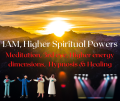 IAM Higher Spiritual Powers
IAM Higher Spiritual Powers Becoming Ultimate Masters
Becoming Ultimate Masters The Power of the Mind and Positive Thought
The Power of the Mind and Positive Thought Achieving and Retaining Abundance and satisfaction
Achieving and Retaining Abundance and satisfaction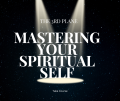 The 3rd Plane: Mastering Your Spiritual Self
The 3rd Plane: Mastering Your Spiritual Self Secrets to a Successful Life
Secrets to a Successful Life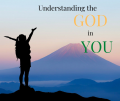 The Great News: Understanding the God within You
The Great News: Understanding the God within You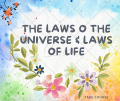 The laws of the Universe and the Laws of LifeSpirituality
The laws of the Universe and the Laws of LifeSpirituality
 Gerald BusingeOut-of-Body Experiences and the Nature of Reality by Darius J Wright
Gerald BusingeOut-of-Body Experiences and the Nature of Reality by Darius J Wright Gerald BusingeOut-of-Body Experiences and the Nature of Reality by Darius J Wright
Gerald BusingeOut-of-Body Experiences and the Nature of Reality by Darius J WrightKathieOut-of-Body Experiences and the Nature of Reality by Darius J Wright
Harry StevensonOut-of-Body Experiences and the Nature of Reality by Darius J Wright
The 3rd Plane: Mastering Your Spiritual Self
Jáckson Patrick Nnamdi ÁchusimThe Eye of the I: from which nothing is hidden by David R Hawkins
The laws of the Universe and the Laws of Life
The Science of Getting Rich - The Ultimate MastersHow to Observe the Cosmic Law: Guidance from the Angels and Spiritual Hierarchy
 Through the Gates of Good: James Allen’s Path to RighteousnessPower of God
Through the Gates of Good: James Allen’s Path to RighteousnessPower of God Thought Vibration and the Law of AttractionPhysical wellbeing
Thought Vibration and the Law of AttractionPhysical wellbeing Think and Grow Rich: Napoleon Hill’s PrinciplesMental wellbeing
Think and Grow Rich: Napoleon Hill’s PrinciplesMental wellbeing Tao Te Ching (McDonald Translation)General
Tao Te Ching (McDonald Translation)General Secret Door to Success: Spiritual Laws and Practical WisdomPhysical wellbeing
Secret Door to Success: Spiritual Laws and Practical WisdomPhysical wellbeing I AM Discourses: The Seven Mighty ElohimProsperity
I AM Discourses: The Seven Mighty ElohimProsperity The Power of the Spoken Word: Scovel Shinn’s GuidePower of God
The Power of the Spoken Word: Scovel Shinn’s GuidePower of God Power Versus Force: Anatomy of ConsciousnessMental wellbeing
Power Versus Force: Anatomy of ConsciousnessMental wellbeing Out From The Heart: Mastering the Inner LifeProsperity
Out From The Heart: Mastering the Inner LifeProsperity New Thought Healing Made Plain: A Guide to Mental силыProsperity
New Thought Healing Made Plain: A Guide to Mental силыProsperity
Featured Downloads
- Download “A common sense view of mind cure by Laura Westall” common-sense-view-of-the-mind-cure-by-Laura-Westall.pdf – Downloaded 19801 times – 1.54 MB
- Download “A movement within God by Neville Goddard” a-movement-within-god-neville-goddard.pdf – Downloaded 21919 times – 2.24 MB
- Download “Abdullah's Teachings: Manifesting Reality Through Divine Oneness” Lessons-from-ABD-Allah1.pdf – Downloaded 9726 times – 803.08 KB
- Download “Awakening the Third Eye by Samuel Sagan” Awakening-the-Third-Eye-pdf.pdf – Downloaded 18814 times – 1.96 MB
- Download “Byways to blessedness by James Allen” byways-to-blessedness-James-Allen.pdf – Downloaded 1410 times – 1.73 MB
- Download “Cosmic Power and Divine law” Cosmic-power-and-devine-law.pdf – Downloaded 15009 times – 8.20 MB
- Download “Divine Science and Healing by Malinda Cramer” divine-science-and-healing.pdf – Downloaded 31126 times – 2.59 MB
- Download “Download Above Life's Turmoil by James Allen” above-lifes-turmoil-James-Allen.pdf – Downloaded 19094 times – 1.42 MB
- Download “Download Acres of Diamonds by Russel Herman Conwell” Acres-of-Diamonds-by-Russel-Herman-Conwell.pdf – Downloaded 19371 times – 1.20 MB
- Download “Download Becoming Ultimate Masters: Harnessing your oneness with God, manifesting and having a fulfilling life” UG-Becoming-Ultimate-Masters.pdf – Downloaded 11609 times – 4.37 MB



0 responses on "Universal Laws: A Path to Wisdom and Fulfillment"